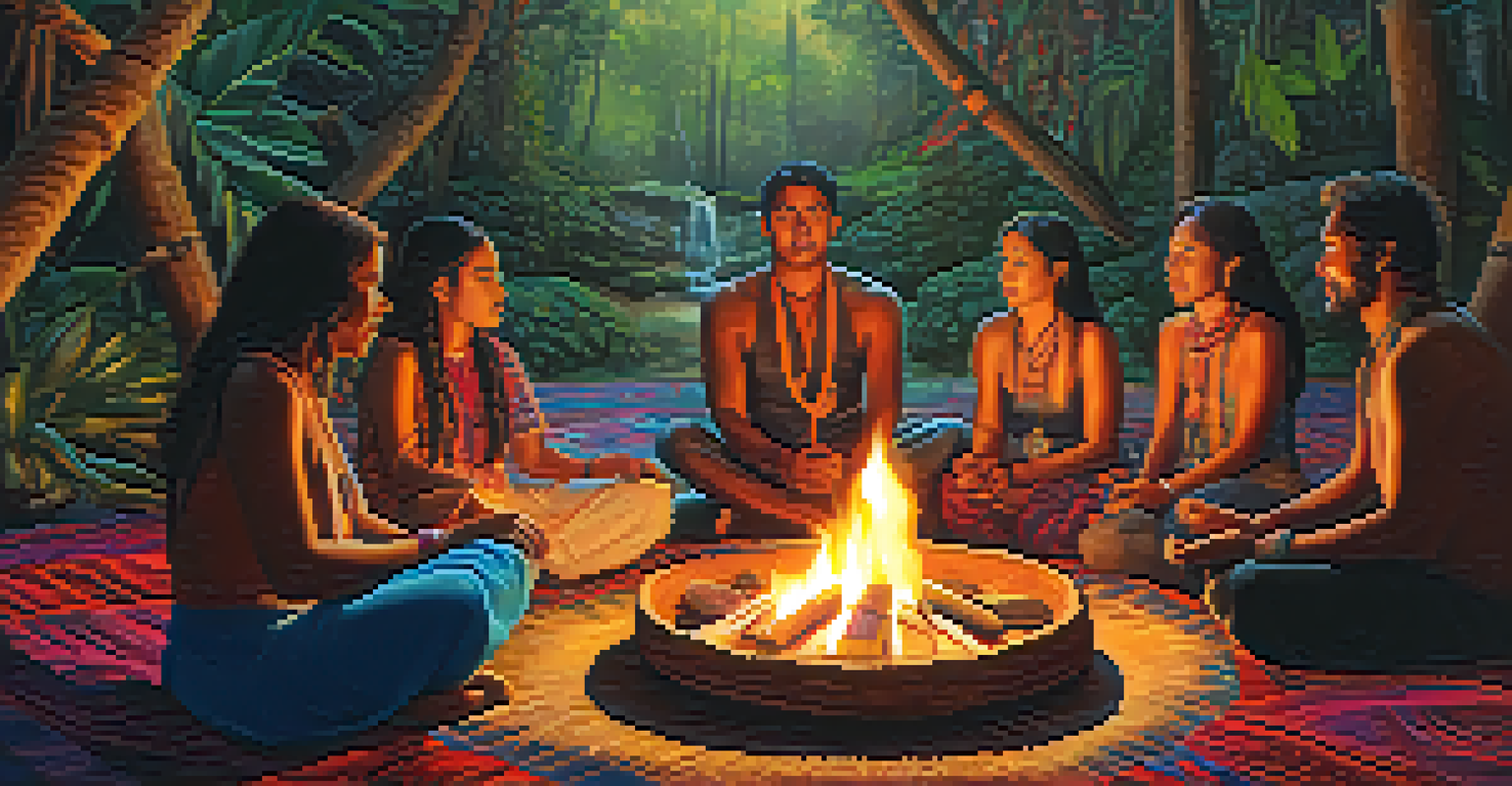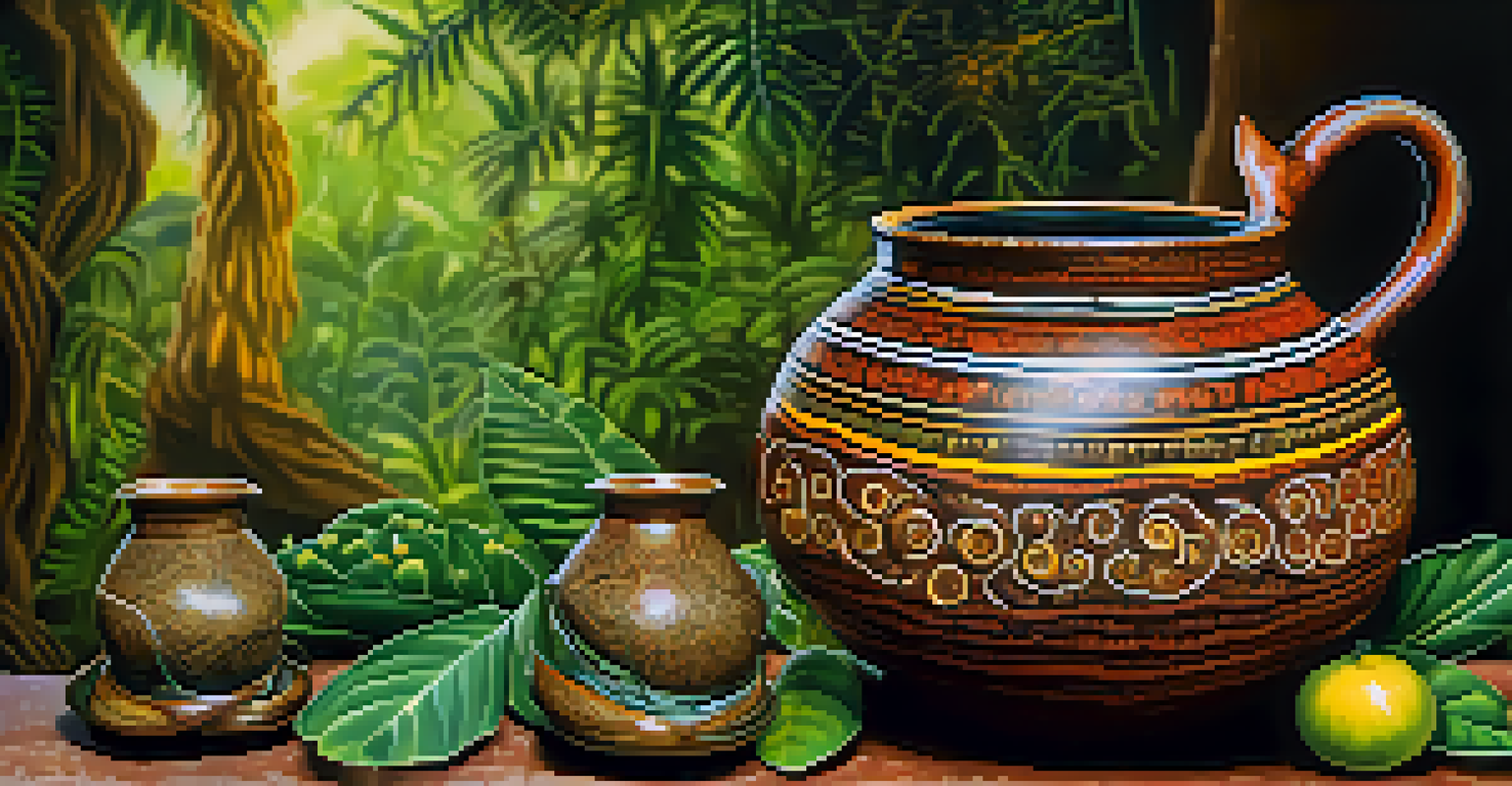Cultural Perspectives: Ayahuasca in Modern Society

Understanding Ayahuasca: A Traditional Medicine
Ayahuasca is a powerful brew made from the Banisteriopsis caapi vine and other plants, traditionally used by Indigenous tribes in the Amazon for healing and spiritual ceremonies. This sacred drink is believed to facilitate profound introspection and connect individuals with the spiritual realm. For centuries, shamans have guided participants through Ayahuasca ceremonies, helping them confront personal issues and gain insights into their lives.
The medicine of the Amazon is a guide to the spirit world, a profound path to healing and self-discovery.
In these traditional settings, the experience often includes singing icaros, or healing songs, which serve to enhance the journey and create a communal atmosphere. The cultural significance of Ayahuasca cannot be overstated; it's more than just a substance—it's a way of life that embodies the wisdom and practices of ancient cultures. As society becomes increasingly interested in holistic healing, Ayahuasca’s traditional roots offer valuable lessons on community, respect for nature, and the importance of ritual.
However, as Ayahuasca gains popularity outside its native context, it raises questions about cultural appropriation and the commodification of Indigenous practices. It’s crucial that we approach these ceremonies with sensitivity and understanding, ensuring that the wisdom of the original cultures is honored and preserved.
The Rise of Ayahuasca Tourism
In recent years, Ayahuasca tourism has exploded, attracting individuals from around the globe seeking transformative experiences. People often travel to the Amazon or other retreat centers to participate in Ayahuasca ceremonies, hoping to find healing, clarity, or personal growth. This surge in interest has created a booming industry, with numerous retreat centers popping up, each promising unique experiences.

While many participants report life-changing insights and healing, the rapid growth of Ayahuasca tourism has also led to concerns about the sustainability of these practices. Some retreat centers prioritize profit over authenticity, which can dilute the traditional ceremonies and exploit the very cultures that birthed them. This commodification highlights the need for responsible tourism, where respect for the culture and environment is paramount.
Ayahuasca's Cultural Significance
Ayahuasca is not just a substance; it embodies the healing traditions and communal values of Indigenous cultures in the Amazon.
Moreover, issues surrounding safety and the proper integration of these experiences arise. Newcomers may not be fully prepared for the intensity of an Ayahuasca journey, leading to psychological distress or adverse reactions. As participants seek guidance, it’s essential that they find reputable facilitators who honor the traditions and prioritize the well-being of their guests.
Ayahuasca's Potential in Mental Health Treatment
Recent studies have begun to explore Ayahuasca's potential benefits for mental health, particularly in treating conditions like depression, anxiety, and PTSD. The brew contains DMT, a compound that alters consciousness and can lead to profound psychological insights. Some researchers suggest that these experiences may help individuals process trauma and confront emotional challenges in a unique way.
We must respect the roots of Ayahuasca and ensure that the wisdom of Indigenous cultures is honored and preserved.
Many participants have reported significant improvements in their mental health following Ayahuasca ceremonies, often citing newfound clarity and emotional release. Anecdotal evidence suggests that these experiences can facilitate healing by allowing individuals to face their fears and traumas in a supportive environment. However, it's important to recognize that such experiences are highly subjective and can vary widely among individuals.
Despite promising findings, further research is needed to understand the long-term effects of Ayahuasca on mental health. Ethical considerations also arise, particularly regarding informed consent and the potential for misuse in non-traditional settings. As interest in Ayahuasca as a therapeutic tool grows, it's vital that we approach this area of study with caution and respect for the cultural contexts from which these practices originate.
Cultural Appropriation vs. Cultural Appreciation
As Ayahuasca gains popularity in Western society, the conversation around cultural appropriation versus cultural appreciation intensifies. Cultural appropriation refers to the adoption of elements from one culture by members of another, often without permission or understanding. In the case of Ayahuasca, this can manifest when individuals engage with the brew without acknowledging its cultural significance or origins.
On the other hand, cultural appreciation involves respecting and valuing the practices and beliefs of another culture, often through education and collaboration. To navigate this complex terrain, it’s essential for those interested in Ayahuasca to educate themselves about its roots, engage with Indigenous communities respectfully, and seek to honor the traditions surrounding its use.
Challenges of Ayahuasca Tourism
The rapid rise of Ayahuasca tourism raises concerns about cultural appropriation, safety, and the sanctity of traditional practices.
This distinction is crucial, as the commodification of Ayahuasca can lead to harmful stereotypes and erasure of Indigenous voices. By fostering a respectful understanding of Ayahuasca's cultural context, individuals can create more meaningful connections and support the preservation of these vital traditions.
The Role of Shamans in Ayahuasca Ceremonies
Shamans play a pivotal role in Ayahuasca ceremonies, serving as guides and facilitators for participants on their journeys. Often considered spiritual leaders, shamans are deeply knowledgeable about the plants, their properties, and the rituals involved in their use. Their expertise helps create a safe and sacred environment for participants to explore their inner selves.
During the ceremony, shamans use icaros to invoke spirits and set intentions, fostering a connection between the participants and the spiritual realm. Their presence reassures participants, helping them navigate the sometimes intense emotional experiences that can arise during the journey. This guidance is essential, as it allows individuals to process their experiences in a supportive space.
However, the growing popularity of Ayahuasca has led to a surge in untrained individuals claiming to be shamans. This raises concerns about the authenticity of the experiences being offered and the potential for harm. It's vital for participants to seek out experienced and culturally knowledgeable shamans to ensure a respectful and safe ceremony.
Integration: Making Sense of the Experience
Integration refers to the process of making sense of the insights and experiences gained during an Ayahuasca ceremony. After such profound journeys, participants often find themselves with a wealth of reflections and emotions that can be overwhelming. Integration support can come in various forms, from therapy to community support groups, helping individuals process and apply their experiences to their daily lives.
Many individuals find that discussing their experiences with others who have undergone similar journeys can be incredibly beneficial. This shared understanding fosters a sense of community and belonging, reinforcing the lessons learned during the ceremony. Additionally, journaling or creative expression can serve as powerful tools for integration, allowing participants to articulate their experiences in a meaningful way.
Integration for Lasting Healing
The integration process is vital for participants to effectively process and apply the insights gained from Ayahuasca ceremonies to their daily lives.
The integration phase is crucial for ensuring that participants can carry the insights and healing they gained into their everyday lives. With proper support and reflection, the transformative potential of Ayahuasca can extend beyond the ceremony, leading to lasting positive changes.
The Future of Ayahuasca in Global Culture
As Ayahuasca continues to make waves in global culture, its future holds both promise and challenges. The increasing interest in alternative healing modalities suggests that Ayahuasca may play an important role in expanding our understanding of mental health and spirituality. However, navigating this landscape requires careful consideration of ethical practices, cultural sensitivity, and sustainability.
The conversation around Ayahuasca is evolving, with more voices advocating for responsible tourism and respect for Indigenous traditions. As awareness grows, so does the potential for collaborations that honor the cultural roots of Ayahuasca while providing valuable experiences for participants. These partnerships can help ensure that the benefits of Ayahuasca are shared equitably and sustainably.

Ultimately, the future of Ayahuasca in modern society hinges on our ability to engage with it thoughtfully and respectfully. By valuing the cultural heritage behind this powerful brew, we can create a more inclusive and meaningful approach to its use, fostering connections that enrich both individuals and the communities from which Ayahuasca originates.